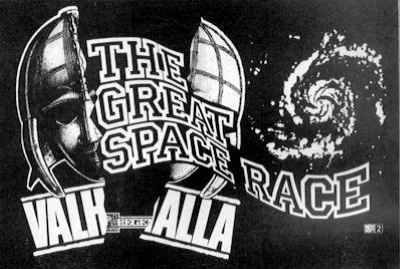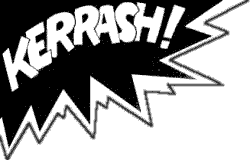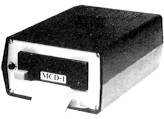

Legend have announced their second title — it’s called The Great Space Race (or, in a world of jargon — TGSR for short). With a prescience based firmly in sensible marketing techniques, the company which was originally named Microl, changed its name to Legend shortly after the release of their first game, Valhalla. In a short space of time and with only one product, Legend have indeed become something of a legend.
Valhalla has clocked up some pretty impressive statistics something in excess of £2m in sales on the Spectrum alone with launch orders in the region of a quarter of a million pounds for the Commodore version. The game swept the boards to win the Leisure Program of the Year award from the Computer Trades Association and the Game of the Year award in the 1984 British Microcomputer Awards run by Personal Computer Games.
No surprise, then, that the recent announcement about their second game should have caused such a stir among the press.
The Great Space Race continues the development of ideas first seen in Valhalla, although TGSR is not a ‘Valhalla clone’. In keeping with Valhalla, however, TGSR is going to be a hard game to categorise — neither adventure, nor strategy, it combines many of their elements into an arcade situation. The basic premise of the game is very simple — the player will be engaged in a death struggle against the computer to win a race through space. It is split into two distinct sections, the first being to select a crew for your racing ship, the second being the race itself. As I said, the premise is simple, the game isn’t. The concept of ‘moviesoft’ is to make computer games more like interactive films, and the stick figures of Valhalla have now become fully animated beings. Legend are particularly proud of their routine with the dubious title of FRIG (which stands for Facial Region Interpreted Graphics). What it means to the player is that the characters you control are animated right down to the facial details.

In part one you must bargain with computer controlled characters for a crew and for back up fighters. As in Valhalla, the game continues with or without you so you may well find that by the time you’ve negotiated for, say, a good fighter pilot, the crew member you also wanted has been snapped up by the computer for its crew. The second part, which is more of an arcade type game, is a very violent race with no holds barred. It requires fast thinking as options always have a time limit on them, but is played with single key presses to activate any option. All your characters talk to you over the Vidphone, appearing in person to ask for instruction. A typical action request might be from a fighter who wants to know whether he could chase and attempt to destroy another fighter trailing you, whether he should just follow it or ignore it. All the characters are individuals and must be chosen for their abilities.
No decision has yet been taken on how many ‘enemy’ characters you will be racing against. This is being currently determined by the Legend secret play test group. The game, too, is still under wraps but Legend say that the screen graphics are presented in true solid 3D, not wire frame, and the program has a Camera Director Module which can present literally billions of possible views of space.
Legend itself has remained something of a mystery. ‘We are not, by nature, a high profile company,’ says its chairman, John Peel. ‘We let the product speak for us and so all the emphasis is put on the product.’ At the centre is the husband and wife team John and Jan Peel with the marketing back-up of Peter Moxham. A team of some seven other programmers work on the games both in-house and on a contractual basis. ‘When we started,’ says John, ‘we wanted to put together the finest software team, all very professional programmers.’
Their efforts are concentrated on one project at a time. TGSR is a much bigger project than Valhalla and John says they have spent close on a quarter of a million developing it ready for its October launch on both the Spectrum and the Commodore.
John Peel acts as overall producer, co-ordinating the development of the game, while Jan is responsible for much of the characterisation and still regards the people of Valhalla as her ‘children’. They operate from a suite of offices in the suburban surroundings of Chingford, North London, only a stone’s throw from Epping Forest. Upstairs are rooms which contain the development environment. Unusually, Legend’s games are developed on BBC Micros, heavily modified and backed up with plenty of disc storage. Asked whether they would eventually translate Valhalla and TGSR on the Beeb, John snorted contemptuously and replied that the machine couldn’t cope with the memory requirements.
It won’t be long to wait now for what Peel describes as their spectacular futuristic romp. Readers of CRASH will be given a treat and should keep their eyes peeled in the next month’s issue, as we will be running a competition with The Great Space Race — but you’ll have to be good as there are only a select number of winners possible. The launch is being backed by T-shirts and sweatshirts, a strong advertising campaign and the kind of detailed presentation that made Valhalla a success. And what comes after The Great Space Race? What about the future, I asked John Peel?
He looked thoughtfully up at the ceiling and said softly, ‘Yes, we are thinking about the future...’
The Open University has made its Micros in Schools ‘Awareness Pack’ available for the 48K Spectrum to enable parents — as well as teachers — to understand the many ways children can benefit from the use of computers in the classroom. The pack is designed for computing novices and brings the user to the point where it is possible to connect up, switch on and use the educational material on the microcomputer, evaluate its potential and understand enough computer jargon to communicate with computer experts, it is claimed.

The hardware add-on people Thurnall Electronics have launched a low-priced 3 inch drive for the Spectrum. It may be used with either 16K or 48K machines and allows the use of other add-ons. The Disc Basic allows the user to SAVE and LOAD programs, programs which start at a specific line automatically, pictures in full colour, strings, string arrays and multi-dimensional string arrays, numeric array and multidimensional numeric arrays, as well as code to/from any specified memory locations. The drive will cope with 150K of data capacity per disc (200K unformatted). The 3 inch disc drive costs £199 and comes complete with all cables and plugs.
If you like complicated board games with an adventure feel to them, then you will probably have visited the excellent Games Workshop shops in London, Manchester, Sheffield, Nottingham or Birmingham. Hives of dungeons and dragons industry, Games Workshop have also been selling appropriate computer games. Now they have launched two games for the 48K Spectrum on their own label — Battlecars and D-Day. Battlecars is set in the year 2081 and involves two players battling to the death in illegal car duels fighting with missiles, machine guns and mines. D-Day is a graphic wargame based on the Normandy landings of 1944. Two players take the part of the Allied and German sides, battling through four different locations. The players have between forty and sixty units each to deploy including tanks, bridge-layers, infantry and ships. Both games should be available from October, priced at £7.95. Watch the next issue for more details!
Sinclair Research is to spend £2.5m on promoting the ZX Spectrum computer over this coming pre-Christmas period. They expect to sell a further 500,000 units between now and Christmas. In contrast the QL only gets a budget of £1.3m. A further sum of £200,000 will be spent promoting the free software that Sinclair is giving away with each Spectrum purchased.
As we announced in the June issue of CRASH DK’TRONICS have now made the draw of entries to their Spectrum Owners Club. Winner of the fist prize, the Sinclair QL computer is Richard Hildrick, York. Second prize winner (£100) is Andrew Fairholm, Rugby. Third prize winner (£50) is Simon Harvey, Northants. And the fourth prize winner (£25) is Mark Middleton, Lincs. The winners have been notified by DK’Tronics.
In the August issue we reviewed the strategy/finance game New Venture from Falcon Computing. Unfortunately the price was missing from the review. It is £5.95.
Newsfield Limited, the publishers of CRASH Magazine, have appointed Mr. Tom Hamilton to be Circulation Manager. Tom Hamilton has spent many years in the wholesale and retail side of magazine sales and also has substantial interests in computer and software sales. He will be operating from his offices in Birmingham and will be interested to hear from any readers or retailers who encounter difficulties in obtaining CRASH in their locations.